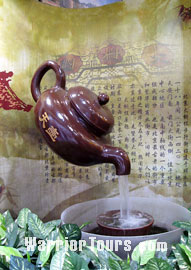Culture
Just as many Western cultures have become coffee dependent, tea is a necessity in Chinese daily life together with firewood, rice, oil, salt, soy sauce and vinegar. As the home of tea, China has a very long history of tea production and drinking. The Chinese tea ceremony enjoys a worldwide reputation, a tradition that spread into Japan as early as the Tang Dynasty (618 -907).
 Over the years, tea has become an essential part of Chinese culture, in poetry, pictorial art, as well as the classification and customs attached to the pleasures of tea. Chinese people pay much attention to tasting tea not merely drinking it. They try to pursue the original taste of the tea and enjoy the fun during the drinking process. There can be little doubt that in a busy schedule a break for a refreshing cup of tea is sure to provide relaxation and refreshment. It is also a known fact that much depends upon the water used as it will have an effect upon the tea. Even the method by which the tea is infused or the wares used to prepare and drink it will have a vastly different effect.
Over the years, tea has become an essential part of Chinese culture, in poetry, pictorial art, as well as the classification and customs attached to the pleasures of tea. Chinese people pay much attention to tasting tea not merely drinking it. They try to pursue the original taste of the tea and enjoy the fun during the drinking process. There can be little doubt that in a busy schedule a break for a refreshing cup of tea is sure to provide relaxation and refreshment. It is also a known fact that much depends upon the water used as it will have an effect upon the tea. Even the method by which the tea is infused or the wares used to prepare and drink it will have a vastly different effect.
To make tea well, good quality water is necessary. Fresh water that is pure, sweet, cool, clean and flowing is best. As a result, people often choose spring water, rain and snow water, of which the spring water and the rainwater in autumn are considered to be the finest.
![]() Tea and Etiquette
Tea and Etiquette
China is a country with an ancient civilization, well known for its rites and etiquettes. Whenever guests are entertained, offering them tea is a tradition throughout China. A host should treat his guests to their favorite teas using his best tea wares as a show of respect. When drinking tea with guests, attention is given to the amount of infused tea left in their cups and teapots and water is added as necessary. For the guests, not taking at least a sip might be considered rude in some areas, and usually the teacup should be emptied in three gulps.
![]() Tea and Marriage
Tea and Marriage
In ancient China, when a man and a woman decided to marry, the man had to exchange or buy the woman with some betrothal gifts. Because marriage concerns the couple's life-long happiness, betrothal gifts have some economic value for the parents of the couple, but those auspicious things that can stave off ill fortune and bring good luck have more importance and emphasis. Tea, as a kind of necessary betrothal gift, has special meanings. As tea trees may not be transplanted lest they will die, tea thus represents faithfulness unto death. Even today, engagement is still referred to as 'receiving tea' or 'eating tea', the earnest money for the engagement is called 'tea money', and the betrothal gifts are named 'tea gifts' in most parts of rural China.
![]() Tea and Sacrifice
Tea and Sacrifice
In the colorful Chinese folk customs, tea has a close relationship with sacrifice. There is a folk saying, that 'there is no sacrifice if there is no tea.' In the book History of Qi of the Southern Dynasties by Xiao Zixian, writer and historian of Later Liang (907-923), tea is recorded as a sacrifice. Tea can be offered as a sacrifice to heaven, earth, god, Buddhists as well as the soul. From royalty to common folk, everyone could afford tea, so a tea sacrifice was a common custom in ancient China. People would offer as a sacrifice infused tea, dry tea or some would offer a token sacrifice with just teapots and teacups.
![]() Tea and Superstition
Tea and Superstition
Tea was also used for funereal purposes, for people thought that it could absorb the strong smells and help to preserve the remains. Such superstitious people think that the ghosts in the nether world would let the departed saint drink the 'magic potion' to remove their memory, thus the ghosts could ride roughshod over them. Put a package of tea in the hands of the departed saint and it will help to avoid that, because they could drink tea when feeling thirsty and the tea can refresh them as well.

